
The bay leaf is an aromatic leaf commonly used as a herb in cooking. It can be used whole, either dried or fresh, in which case it is removed from the dish before consumption, or less commonly used in ground form. The flavor that a bay leaf imparts to a dish has not been universally agreed upon, but many agree it is a subtle addition.
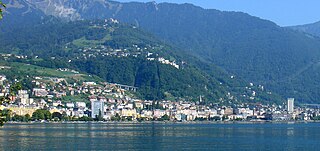
Montreux is a Swiss municipality and town on the shoreline of Lake Geneva at the foot of the Alps. It belongs to the Riviera-Pays-d'Enhaut district in the canton of Vaud, having a population of approximately 26,500, with about 85,000 in the Vevey-Montreux agglomeration as of 2019.
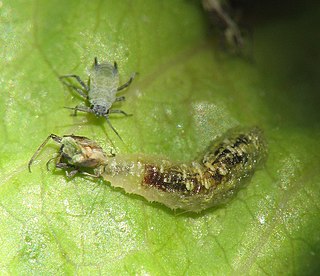
Biological control or biocontrol is a method of controlling pests, whether pest animals such as insects and mites, weeds, or pathogens affecting animals or plants by using other organisms. It relies on predation, parasitism, herbivory, or other natural mechanisms, but typically also involves an active human management role. It can be an important component of integrated pest management (IPM) programs.
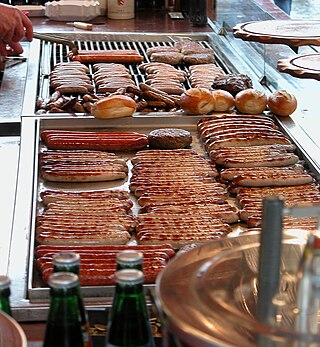
Bratwurst is a type of German sausage made from pork or, less commonly, beef or veal. The name is derived from the Old High German Brätwurst, from brät-, finely chopped meat, and Wurst, sausage, although in modern German it is often associated with the verb braten, to pan fry or roast. Beef and veal are usually incorporated amongst a blend often including pork. Beef or veal is usual in halal and kosher Bratwurst sausages, which never include pork for religious reasons.

The Colorado potato beetle is a beetle known for being a major pest of potato crops. It is about 10 mm long, with a bright yellow/orange body and five bold brown stripes along the length of each of its elytra. Native to the Rocky Mountains, it spread rapidly in potato crops across America and then Europe from 1859 onwards.
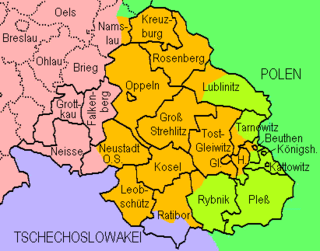
The Upper Silesia plebiscite was a plebiscite mandated by the Versailles Treaty and carried out on 20 March 1921 to determine ownership of the province of Upper Silesia between Weimar Germany and Poland. The region was ethnically mixed with both Germans and Poles; according to prewar statistics, ethnic Poles formed 60 percent of the population. Under the previous rule by the German Empire, Poles claimed they had faced discrimination, making them effectively second class citizens. The period of the plebiscite campaign and inter-Allied occupation was marked by violence. There were three Polish uprisings, and German volunteer paramilitary units came to the region as well.

The Asian long-horned beetle, also known as the starry sky, sky beetle, or ALB, is native to the Korean Peninsula, northern and southern China, and disputably in northern Japan. This species has now been accidentally introduced into the eastern United States, where it was first discovered in 1996, as well as Canada, and several countries in Europe, including Austria, France, Germany, Italy and UK.

The common cockchafer, also colloquially known as the Maybug, Maybeetle, or doodlebug, is a species of scarab beetle belonging to the genus Melolontha. It is native to Europe, and it is one of several closely-related and morphologically similar species of Melolontha called cockchafers, alongside Melolontha hippocastani.

Melolontha hippocastani, the northern cockchafer, is a species of scarab beetle native to Eurasia, with its range spanning from Western Europe to the Pacific coast of China. It is one of several species in the genus Melolontha known as cockchafers, alongside the common cockchafer and Melolontha pectoralis, but generally at more northern latitudes, or at higher altitudes in upland woods further south. The adults are around 20–29 mm in length. It is distinguished from Melolontha melolontha by the shape of its pygidium, which is primarily black in colour. It primarily dwells in forests, and as such is also known as the forest cockchafer. The mate-finding behaviour in M. hippocastani is facilitated by plant volatiles and sex pheromones. Mating activities primarily takes place during the evening flight periods. Females lay their eggs in soil, and the larvae feed on decaying organic matter and later small plant roots, including the roots of young trees like pines and firs. The larvae usually develop between 3 and 5 years. They emerge between late April and the end of June. Like other cockchafers, they have been considered a serious pest of crops and trees.

The Standard Superior was an automobile, produced from 1933 to 1935 by Standard Fahrzeugfabrik of Ludwigsburg, Germany, founded by motorcycle maker Wilhelm Gutbrod and unrelated to the Standard Motor Company of England. These small cars were designed according to the patents by Josef Ganz and featured rear-mounted two-stroke engines.

Josef Ganz was a Jewish-German car designer born in Budapest, Austro-Hungarian Empire.
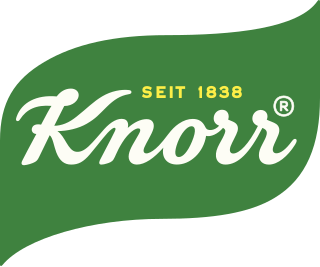
Knorr is a food and beverage brand based in Heilbronn, Germany and founded in 1838. It has been owned by the British company Unilever since 2000, when Unilever acquired Best Foods, excluding Japan, where it is made under license by Ajinomoto. It produces dehydrated soup and meal mixes, bouillon cubes and condiments.
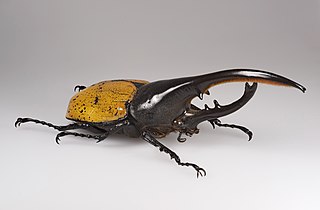
The Hercules beetle is a species of rhinoceros beetle native to the rainforests of southern Mexico, Central America, South America, and the Lesser Antilles. It is the longest extant species of beetle in the world, and is also one of the largest flying insects in the world.

A bouillon cube is dehydrated broth or stock formed into a small cube or other cuboid shape. The most common format is a cube about 13 mm wide. It is typically made from dehydrated vegetables or meat stock, a small portion of fat, MSG, salt, and seasonings, shaped into a small cube. Vegetarian and vegan types are also made. Bouillon is also available in granular, powdered, liquid, and paste forms.

Catalans are a Romance ethnic group native to Catalonia, who speak Catalan. The current official category of "Catalans" is that of the citizens of Catalonia, a nationality and autonomous community in Spain and the inhabitants of the Roussillon historical region in southern France, today the Pyrénées Orientales department, also called Northern Catalonia and Pays Catalan in French.

The Swiss people are the citizens of the multi-ethnic Swiss Confederation (Switzerland) regardless of ethno-cultural background or people of self-identified Swiss ancestry.
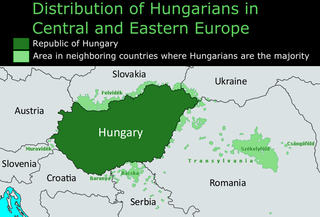
The Hungarian diaspora comprises the total ethnic Hungarian population located outside current-day Hungary.

Maikäfer was the nickname of an automobile prototype, built in 1931 by German engineer Josef Ganz at Adler.

Wiener schnitzel, sometimes spelled Wienerschnitzel, is a type of schnitzel made of a thin, breaded, pan-fried veal cutlet served without sauce.

Anomalites is an extinct genus of shining leaf chafer scarab beetle which contains the solitary species Anomalites fugitivus. The species was found preserved in Eocene age quartz from Central France and was first described by Antonín Frič.




















